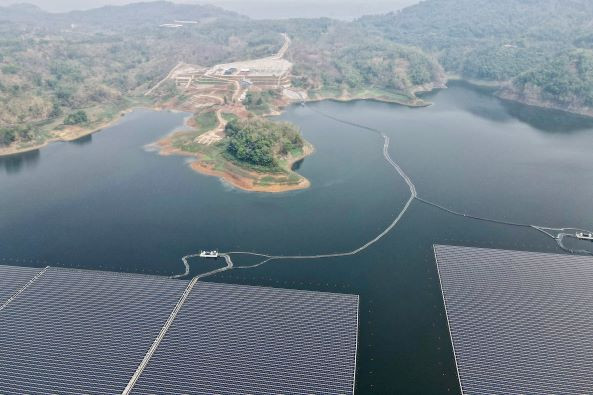Popular Reads
Top Results
Can't find what you're looking for?
View all search resultsPopular Reads
Top Results
Can't find what you're looking for?
View all search resultsTo stay competitive, Indonesia must prioritize renewables
Today, energy policy is investment policy, and Indonesia risks being left behind.
Change text size
Gift Premium Articles
to Anyone
A
cross Southeast Asia, multinational firms are expanding their footprint, setting up new factories, building data centers and strengthening supply chains. Indonesia, with its large economy and strategic location, should be leading the region in attracting that investment.
However, without access to reliable and affordable renewable electricity, businesses are looking elsewhere. Today, energy policy is investment policy, and Indonesia risks being left behind.
Clean energy is no longer just about meeting climate targets. For many companies, it has become a make-or-break factor when deciding where to expand, build and invest.
Companies in sectors like manufacturing, textiles, food processing and technology have set ambitious decarbonization goals, many targeting net-zero emissions before 2050. To meet their goals, they need to power their operations with clean energy. In practice, that means locating in countries where renewable power is available, affordable and accessible through the central grid or via clear purchasing pathways.
Indonesia has taken important steps to expand its renewable energy supply, with 76 percent of new capacity additions within the Rencana Usaha Penyediaan Tenaga Listrik 2025 (RUPTL 2025), or Indonesia’s Electricity Supply Business Plan, coming from renewables.
Nonetheless, corporate buyers are seeking a more diversified menu of procurement options. Unbundled Renewable Energy Certificates (RECs) are currently the most viable option for corporate procurement in Indonesia. But while useful, RECs do not support the large-scale, long-term investments businesses are planning. Companies are looking for structural solutions to source renewables locally, such as Corporate Power Purchase Agreements (CPPAs) and the joint utilization of transmission and distribution networks, known globally as power wheeling.
A recent paper by Climate Group’s RE100 campaign, Institute for Essential Services Reform (IESR) and the Institute for Energy Economics and Financial Analysis (IEEFA) explained how shared use of Indonesia’s transmission and distribution network would allow different stakeholders to deliver electricity from generation sources to load centers. These mechanisms would allow companies to contract clean electricity directly and at scale from renewables-rich areas to business hubs, through state electricity company PLN’s grid.
Other countries in the region are already moving faster – with both Vietnam and Malaysia introducing schemes that allow third parties to supply or buy electricity through the existing grid network. Thailand has enabled eligible customers to purchase both energy and RECs from large renewable energy projects by rolling out the second phase of its Utility Green Tariff (UGT2). These policies give companies flexible and transparent pathways to scale their clean energy use, and they are attracting investment.
Indonesia risks falling behind. While Vietnam sourced over 14 percent of its electricity from solar in 2023, Indonesia’s share of solar and wind remains below 3 percent. An estimated Rp 278 trillion (US$16.64) in annual investment is needed if its targets for added renewable capacity are to be met.
The priority therefore is delivering on this plan. With the country’s sovereign wealth fund Danantara launched earlier this year, Indonesia has a timely opportunity to turn capital, policy alignment and partnerships into renewable energy projects. Fossil fuels still account for a significant share of Indonesia’s capacity, and policymakers have sent mixed signals on coal drawdown. While recent geothermal announcements are promising, Indonesia will need a decisive push to match its renewable commitments with bankable projects that draw the investment that is required.
Other Indonesian business leaders share this sense of urgency. Some 88 percent said they want most of the country’s energy supply sourced from renewables within the next ten years. A majority said they would consider relocating operations and contracting supply chains to other countries if Indonesia cannot deliver adequate renewable supplies.
This should set off alarm bells. Sectors like textiles and light manufacturing are already major employers in Indonesia, and many of these companies are under pressure from their customers to clean up supply chains. Global tech firms looking to build data centers are clear in their message: renewable energy access is a key part of site selection.
There is an economic prize waiting for those moving faster on renewable energy. Research shows that meeting clean energy targets will create jobs, boost wages and improve resilience to global fuel price shocks, as shown in ACEC’s May 2025 publication Asia’s Clean Energy Breakthrough. Renewables also reduce dependence on volatile fossil fuel markets, providing more stable pricing for both industry and consumers.
All of this is especially relevant for Indonesia, which has set a target of eight percent annual gross domestic product growth by 2029. Unlocking clean energy investment can be a key enabler of that growth as it’ll attract capital, lower energy costs, improve energy security and fulfill a government promise to create 19 million jobs.
Indonesia still has time to lead the charge on the regional energy transition, but the window is closing. If the country can move quickly, it will be well positioned to compete with its neighbors on energy, and in every sector of the economy that depends on it.
The companies are ready. The demand is real. It is now time for policy to catch up.
---
Suji Kang is the Asia Program director of Asia Clean Energy Coalition (ACEC). Ollie Wilson is the head of RE100 and energy operations at Climate Group. Mutya Yustika is an energy finance specialist at the Institute for Energy Economics and Financial Analysis (IEEFA). The views expressed are personal.











